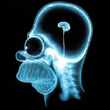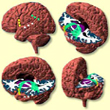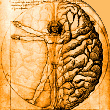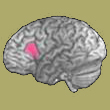Monday, 30 July 2012
The Shrinking Human Brain: What Does It Mean?
 We all know that a few interesting hyperlinks and a bit of curiosity can add up to a massive waste of time. But sometimes it can be time well wasted. Consider, for example, what I learned on the little trip through cyberspace that I’m going to tell you about now.
We all know that a few interesting hyperlinks and a bit of curiosity can add up to a massive waste of time. But sometimes it can be time well wasted. Consider, for example, what I learned on the little trip through cyberspace that I’m going to tell you about now.
Since I live in Montreal and write a web site about the human brain, the on-line article that I’ve listed as the first link below caught my eye. It’s from McGill University, in my home town, and it discusses a book called Big Brain, published in 2008 by two neuroscientists, Gary Lynch and Richard Granger. In this book, the authors describe the discovery of the “Boskops” skull in South Africa in the early 1900s. (more…)
Evolution and the Brain | 2 comments »
Monday, 23 July 2012
Alzheimer’s Type Dementia
 Two months ago, some new content to The Brain from Top to Bottom has been added: a sub-topic entitled “Alzheimer’s Type Dementia” under the main topic “Mental Disorders”. This form of dementia, more commonly referred to as Alzheimer’s disease, receives a lot of attention in the media, but its causes remain uncertain. (more…)
Two months ago, some new content to The Brain from Top to Bottom has been added: a sub-topic entitled “Alzheimer’s Type Dementia” under the main topic “Mental Disorders”. This form of dementia, more commonly referred to as Alzheimer’s disease, receives a lot of attention in the media, but its causes remain uncertain. (more…)
Mental Disorders | No comments
Monday, 16 July 2012
Links About Brain Function

This week, as in an earlier post, I’m providing you with links to and brief descriptions of all the interesting articles that I’ve come across recently on one of the subtopics that I discuss on this site. This time the subtopic is “Function by Level of Organization” (under the main topic “From the Simple to the Complex”). (more…)
From the Simple to the Complex | Comments Closed
Monday, 9 July 2012
Embodied Cognition and Emotions
 Expressions such as “receiving a warm welcome” and “giving someone the cold shoulder” seem to be rooted deep in our bodily experience, or at least, that is the conclusion increasingly suggested by studies on embodied cognition, a field first developed in the 1990s by researchers such as Francisco Varela.* (more…)
Expressions such as “receiving a warm welcome” and “giving someone the cold shoulder” seem to be rooted deep in our bodily experience, or at least, that is the conclusion increasingly suggested by studies on embodied cognition, a field first developed in the 1990s by researchers such as Francisco Varela.* (more…)
Emotions and the Brain, From Thought to Language | 3 comments »
Monday, 2 July 2012
Rethinking the Role of Broca’s Area in Language
 In 1861, Paul Broca observed a sizable lesion in the left inferior frontal cortex of a patient who had just died. This individual had been able to understand what was said to him, but had been unable to pronounce anything but the syllable “tan”. Subsequently, this same observation was confirmed in many other individuals, and Broca’s area, whose destruction results in this form of aphasia (now known as Broca’s aphasia), thus became associated with the production of language.
In 1861, Paul Broca observed a sizable lesion in the left inferior frontal cortex of a patient who had just died. This individual had been able to understand what was said to him, but had been unable to pronounce anything but the syllable “tan”. Subsequently, this same observation was confirmed in many other individuals, and Broca’s area, whose destruction results in this form of aphasia (now known as Broca’s aphasia), thus became associated with the production of language.
But the role attributed to Broca’s area has become far more complex since these initial observations were made. In addition to the production of language, this area is now also believed to be involved in certain semantic aspects of language. For example, Dr. Peter Hagoort’s research using brain imaging shows that the dynamic association of Broca’s area with the left posterior temporal cortex is necessary for understanding language. (more…)
From Thought to Language | 1 comment







